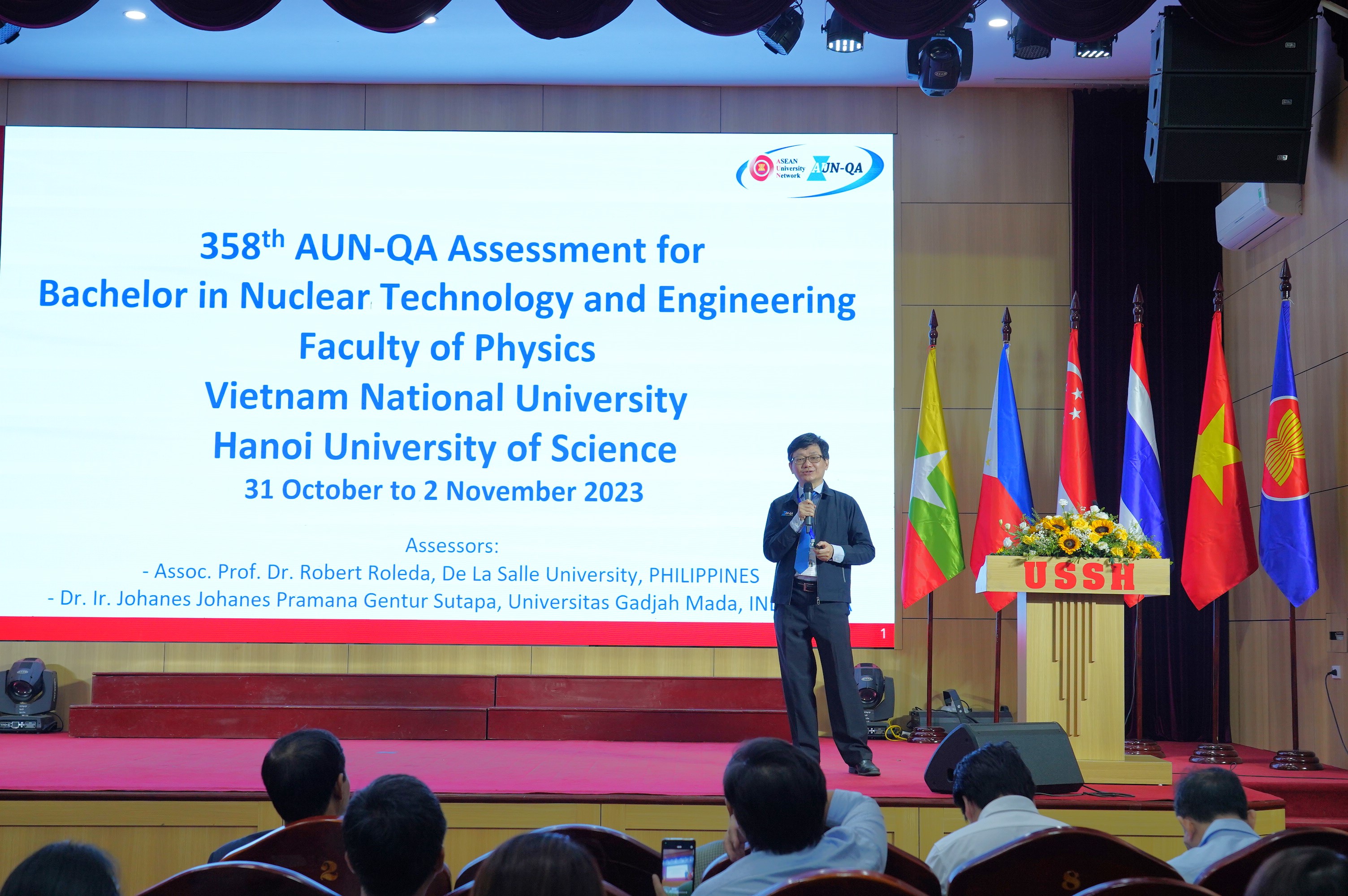After three days of urgent, serious, and effective work, on the morning of November 2, 2023, Vietnam National University, Hanoi (VNU) held the closing ceremony for the 358th ASEAN University Network Quality Assurance (AUN-QA) external assessment for one training program of the University of Sciences and three training programs of the University of Social Sciences and Humanities.
The closing ceremony was attended by Prof.Dr. Rohaida Mohd.Saat, Head of the AUN-QA external assessment team, and other assessors. On the side of VNU, there were Assoc.Prof. Dr. Nguyen Hoang Hai, Deputy Director of VNU; Dr. Nghiem Xuan Huy, Director of the Institute for Education Quality Assurance, VNU; the management boards of the University of Sciences (HUS) and the University of Social Sciences and Humanities (USSH); leaders of functional departments; faculty leaders and lecturers the accredited programs.
The four training programs participating in this assessment were: the Bachelor's program in Sociology (Faculty of Sociology), Bachelor’s program in Psychology (Faculty of Psychology); Bachelor's program in International Studies (Faculty of International Studies), University of Social Sciences and Humanities; Bachelor's program in Nuclear Engineering Technology, Faculty of Physics, University of Sciences.
During the working period from October 31 to November 2, the external assessment team conducted surveys; reviewed evidence documents; interviewed stakeholders including employers, alumni, students; leaders of faculties, departments, centers, functional offices, and faculty representatives; collected feedback from stakeholders; assessed the employment situation of graduates; inspected the facilities serving the training programs such as libraries, classrooms, laboratory rooms, dormitories, and hospitals to verify information in the self-assessment report prepared by the units, thereby providing recommendations to improve and enhance the quality of the training programs. In this assessment, AUN-QA applies version 4.0 of the assessment criteria, with 08 criteria instead of the previous 11. These included 04 criteria about the training programs such as the program’s outcomes, content and structure, teaching and learning approaches, and learner evaluation; 03 criteria about resources such as faculty members, student support activities, and facilities; and 01 criterion about output and results. These criteria were rated on a scale from 1 - 7.
At the closing ceremony, the AUN-QA external assessment team presented preliminary results of the training programs’ quality assessment, where they highly appreciated the overall strengths of the training programs and the achievements in various aspects: curriculum content, teaching, and learning methods, testing, student evaluation, scientific staff, student support services, facilities, employment after graduation, thereby evaluating the quality assurance conditions of the training programs according to the AUN-QA assessment scale. Notably, the assessment team also advised on areas for improvement for each program and proposed measures to enhance the quality of training.
 Assoc. Prof.Dr. Robert Roleda Assessor, Assessor and Head of the Nuclear Engineering Technology Bachelor’s Program assessment team presenting a preliminary assessment at the closing ceremony.
Assoc. Prof.Dr. Robert Roleda Assessor, Assessor and Head of the Nuclear Engineering Technology Bachelor’s Program assessment team presenting a preliminary assessment at the closing ceremony.
The Bachelor’s Program in Nuclear Engineering Technology of the Faculty of Physics, HUS, which participated in this assessment, is a four-year training program that aims to provide high-quality human resources with creative thinking, and the capability to research, develop, and transfer knowledge in the nuclear field. Students in the Nuclear Engineering Technology program are trained to master research skills in the field of nuclear technology, operation of radiotherapy equipment, radiological analysis, radiosurgery, energy, etc., enabling them to quickly adapt to their work after graduation.
 Dr. Ir. Johannes Pramana Gentur Sutapa, assessor for the Nuclear Engineering Technology Bachelor’s program, providing suggestions to improve the program’s quality.
Dr. Ir. Johannes Pramana Gentur Sutapa, assessor for the Nuclear Engineering Technology Bachelor’s program, providing suggestions to improve the program’s quality.
According to the assessment team, the Bachelor’s program in Nuclear Engineering Technology of the Faculty of Physics, HUS, has a number of strengths as follows:
● courses are categorized into groups: general knowledge, basic knowledge, and specialized knowledge. The relationship between these knowledge blocks is clearly and logically delineated, helping to build a correct learning path.
● The program aligns with the requirements of employers, especially in the fields of medicine, environmental and industrial applications, and nuclear research fields.
● Students have autonomy and flexibility in choosing majors and courses within each block of knowledge.
● Students are trained using an active learning strategy through a combination of theory and practice.
● A team of faculty and advisors provide constant support to help students, addressing problems encountered during their learning and research.
Representing the external evaluation team, Prof.Dr. Rohaida Mohd. Saat acknowledged the meticulous preparation and organization and sent thanks to VNU and its member units for their trust in the AUN-QA system. Prof.Dr. Rohaida Mohd. Saat hopes that the conclusions from this assessment will contribute to enhancing the quality of training programs and fostering a closer collaborative relationship between AUN and VNU Hanoi.
Speaking at the closing session, Assoc.Prof.Dr. Nguyen Hoang Hai, Deputy Director of VNU Hanoi, extended gratitude to the AUN-QA external assessment team for their time and efforts in providing valuable feedback and suggestions, helping VNU Hanoi in general. The assessed units, in particular, identify and develop distinctive features for their training programs, thereby improving the quality of teaching and learning.
Associate Professor, Dr. Nguyen Hoang Hai expressed his hope that in the future, AUN-QA could support VNU Hanoi in training and capacity building for its staff and lecturers in the field of program quality assessment. This would be a meaningful activity towards improving the quality of training at Vietnam National University, Hanoi.